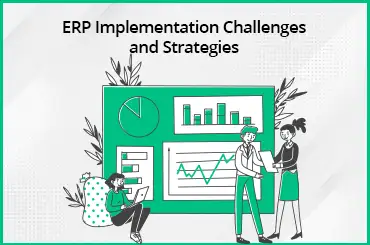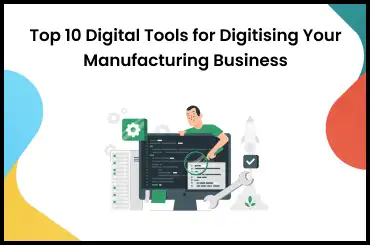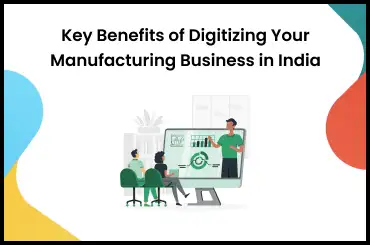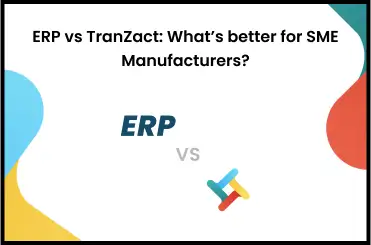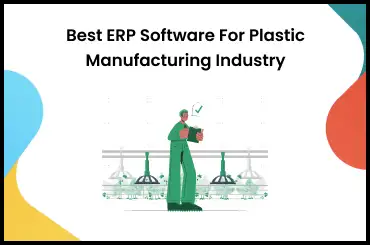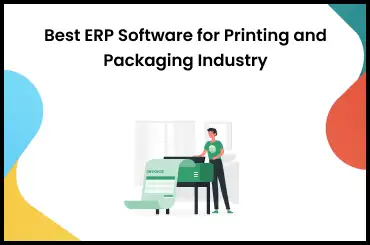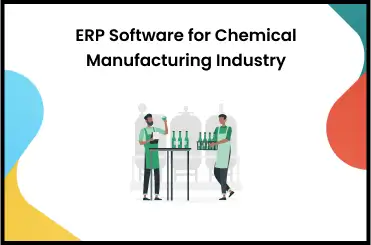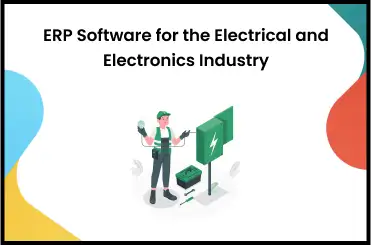A Distribution ERP is software designed for businesses that focus on delivery. Distribution ERP systems give instant information. It streamlines and integrates various aspects of the distribution process, such as:
- inventory management
- order processing
- warehouse management
- purchasing
- sales
- financials
This helps businesses work better, save money, and make customers happier.
What Is Distribution ERP?
The distribution ERP (Enterprise Resource Planning) system helps businesses work better. It makes operations smoother, saves money, and makes customers happier. Distribution ERP does this by giving real-time information and helping to make smart decisions based on data.
Who Needs A Distribution ERP?
Any business in the distribution of goods, whether wholesale or retail, can use a Distribution ERP. This can include:
- distributors
- wholesalers
- manufacturers with distribution networks
- retailers managing multiple locations.
Distribution of ERP solutions is quite important for businesses. They make things run smoother and help businesses manage their stock better.
Additionally, they aim to receive orders with automation. These solutions help businesses use data to make smart choices.
Read Also: What Is Professional Services Automation? The Beginner's Guide To PSA
Five Signs You Need A Distribution ERP
Distribution ERP systems can benefit your business. Let us explore five clear signs that suggest it's time to consider a Distribution ERP solution.
1. Inventory Management Challenges
If you struggle to manage your inventory or face stock shortages and overflows, an ERP distribution module can help a lot. The ERP distribution module helps by organizing inventory and preventing stock problems.
2. Inefficient Order Processing
Manual order processing can be time-consuming and prone to errors. It can result in delayed shipments and dissatisfied customers. A Distribution ERP automates the entire order-to-cash process, from order entry and invoicing to shipping and payment processing.
3. Lack of Data Integration and Insight
When your business works with different systems for various departments like sales, finance, and inventory, gaining a complete view of your business becomes challenging. By connecting these systems with an ERP solution, you can understand your business better.
4. Difficulty in Compliance and Regulations
The best ERP for small distribution businesses needs to follow special industry rules. A Distribution ERP can help you stay updated by automating processes, maintaining accurate records, and generating audit trails.
5. Difficulty in Supply Chain Management
As your distribution business expands, the supply chain's complexity also increases. Without a strong system to manage logistics, warehousing, and transportation, you may face challenges like delayed deliveries and increased working costs.
Read Also: What Is Inventory Management System?
Benefits Of A Distribution ERP
Distribution ERP can help you manage your inventory better and make your work smoother. Let us talk about the specific ways it can help your distribution company work better and save time.
1. Streamlined Operations
The best ERP for manufacturing and delivery combines different business processes like
- stock management
- order processing sales
- finance
2. Improved Inventory Management
A Distribution ERP provides real-time visibility into inventory levels. This helps businesses to optimize stock levels, prevent stockouts, and reduce excess inventory.
3. Enhanced Order Processing
Automation of order processing through a Distribution ERP accelerates the order-to-cash cycle. Processing sales orders faster leads to quicker order fulfillment and lowers the chances of errors.
4. Data-Driven Decision Making
Making informed decisions for the best output is one of the most important parts of a business. A Distribution ERP gives you helpful tools to see important information. It checks
- how a business is doing,
- what customers like, and
- trends in sales.
5. Customer Relationship Management (CRM) Integration
Many Distribution ERPs come with built-in CRM capabilities with CRM systems. This helps to manage customer interactions and sales. These tools make it easier for businesses to connect with customers and improve their overall service.
Read Also: Inventory vs. Stock: What’s the Difference & Why It Doesn’t Really Matter
Embracing the Implementation of Distribution ERP Software: A Practical Guide
Introducing a Distribution ERP (Enterprise Resource Planning) software is a big change for companies that handle distributing things. Businesses must get practical advice about how to do it. They must choose the right system, make it work with what they already have, and help their employees get used to the changes.
1. Gain Executive Support
Obtain buy-in and support from top-level executives. Their Support and commitment to the ERP implementation will foster a culture of enthusiasm and encourage cooperation from all departments.
2. Create a Cross-Functional Team
Assemble a team comprising members from various departments, including IT, finance, sales, and operations.
3. Set Clear Objectives
Set clear and achievable goals for the ERP implementation. These goals should be: SMART-
- specific
- measurable
- relevant
- timeline for completion.
4. Choose the Right ERP
Look closely at different ERP options. This way, you can choose the one that works best for your distribution business and where you want it to go in the future.
5. Plan and Schedule Implementation
Make a detailed plan for how to implement the ERP system. This plan should include
- timelines
- important milestones
- who is responsible for each task.
Allocate sufficient time and resources to each implementation phase to minimize disruptions to daily operations.
Read Also: What Is Production Management?
Why Choose Distribution Erp?
Picking a Distribution ERP (Enterprise Resource Planning) system is helpful for companies that distribute things. It puts all the important tasks, like keeping track of stuff and sending out orders, in one place. This makes things work better, cuts down on mistakes, and gives better information to make smart choices.
1. Integrated Business Processes
A Distribution ERP integrates various business functions like
- inventory management
- order processing
- sales
- finance
- supply chain management into a platform.
2. Streamlined Inventory Management
With a Distribution ERP, you gain better control and visibility over your inventory levels. Accurate real-time data allows for
- optimized stock levels
- reduces carrying costs
- prevents stockouts or overstock situations
This ensures products are available when and where they are needed.
3. Efficient Order Processing
Automation of order processing and fulfillment simplifies the entire order-to-cash cycle. Sales orders are processed faster, reducing the chances of errors and delays. This ultimately leads to improved customer satisfaction.
4. Data-Driven Decision Making
Distribution ERPs provide advanced reporting and analytics tools. This offers valuable insights into
- sales trends
- customer behavior
- performance metrics.
Data-driven decision-making enables you to make informed choices, identify growth opportunities, and address working challenges.
Empower Your Distribution Business: A Complete ERP Solution For Modern Growth And Efficiency
The distribution ERP (Enterprise Resource Planning) system is invaluable for modern distribution businesses. This seeks to
- optimize their operations
- enhance efficiency
- achieve sustainable growth.
Take your distribution business to the next level with a powerful and user-friendly Distribution ERP. Consider TranZact! A cutting-edge ERP solution made especially for distribution businesses.
FAQs On Distribution ERP
1. Is a Distribution ERP different from a regular ERP?
Yes. A Distribution ERP is specifically designed to cater to the unique needs of distribution businesses. While a regular ERP is more generalized and applicable to various industries. Distribution ERPs are good at handling jobs like
- keeping track of what's in stock
- processing orders
- managing how things get from makers to buyers.
Regular ERPs are made to work for lots of different parts of a business, like money, workers, and making stuff.
2. What specific features does a Distribution ERP offer for inventory management?
A Distribution ERP provides advanced inventory management features such as:
- real-time inventory tracking
- automatic stock level adjustments
- inventory forecasting
- warehouse optimization.
3. Is a Distribution ERP suitable for small and mid-sized businesses?
Yes, Distribution ERP systems are available in various sizes and configurations, making them suitable for small, mid-sized, and extensive distribution businesses. They can be changed to fit the needs of each business and help them do their distribution work better.
4. How long does it take to implement a Distribution ERP?
The timeline for implementing a Distribution ERP can vary based on the difficulty of the business processes and the scope of the ERP solution. Additionally, factors such as the level of customization needed, data migration, and the readiness of the organization to adapt to the changes can influence the duration.
5. How does a Distribution ERP improve customer satisfaction?
A Distribution ERP enhances customer satisfaction by:
- fast order processing and fulfillment
- accurate inventory management
- improved customer relationship management
6. Is training required for employees to use a Distribution ERP?
Training is essential for employees to use a Distribution ERP effectively. Thorough training makes sure employees understand the ERP system, perform tasks effectively, and fully leverage its features.








